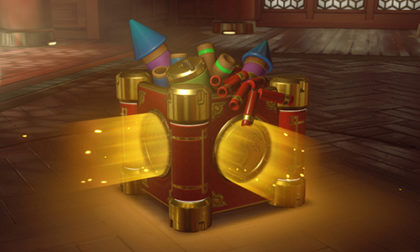UKGC Executive Director Discusses Stance on Loot Boxes
Time to write some more about loot boxes! Recently, lawmakers and regulatory bodies in Belgium and France made their feelings be known about the increasingly prevalent gambling part of video games and on Thursday, it was the United Kingdom Gambling Commission’s turn. In an article posted on the UKGC’s website, the Commission’s Executive Director, Tim Miller, explained the agency’s viewpoint.
“Our starting point in deciding our position with any product is to look closely at whether or not it falls under UK gambling law,” Miller wrote. “The definition of what is legally classed as gambling is set by Parliament rather than by us. Our role is to apply that definition to activities that we see and any changes to that definition need to be made by Parliament.”
Miller said that there is a line demarking what is and what is not gambling and it is the Commission’s job to determine when and if something crosses that line.
“A key factor in deciding if that line has been crossed is whether in-game items acquired ‘via a game of chance’ can be considered money or money’s worth.”

Loot boxes in the game Fortnite take the form of llama pinatas. And they talk.
Image credit: fortnite.wikia.com
Miller then hit the key point, saying, “In practical terms this means that where in-game items obtained via loot boxes are confined for use within the game and cannot be cashed out it is unlikely to be caught as a licensable gambling activity. In those cases our legal powers would not allow us to step in.”
As both a parent and an avid gamer, I fully understand his point, but it is his next sentences that resonates the most with me.
“However, many parents are not interested in whether an activity meets a legal definition of ‘gambling’. Their main concern is whether there is a product out there that could present a risk to their children.”
I have argued that loot boxes are a form of gambling, even if they do not meet the strict definition of gambling as set forth by lawmakers. When you open one, you don’t know exactly what you are going to get. And though you always get something – you never end up empty handed – and there is not usually any real-world value to the items received, you are still taking a chance on something that could be quite useless to you.
That said, not all loot boxes are created equal.
Blizzard’s immensely popular game, Overwatch, has been one of the targets of loot-box critics, likely because of its popularity. As someone who plays the game nearly every day and who also has two kids who enjoy playing it sometimes, as well, I feel that its loot-box system is one of the most harmless in the industry.
Players earn loot boxes through regular play, receiving one every time they earn enough experience points (XP) to level up. Earning XP is quite easy – you just have to play the game – and leveling up occurs fairly frequently. Players can also earn three loot boxes per week for winning nine games (one loot box per three wins) in the Arcade, one of the “non-competitive” areas of Overwatch.
Loot boxes contain only cosmetic items that have no effect on gameplay. Some are rarer than others (I don’t have all of the “legendary” character skins yet) and some are only available during limited time events, but all can be had for free and none are necessary to do well in the game. The items themselves can be purchased with in-game coins; coins are found as items themselves in loot boxes and are also received when a player unveils a loot box item that he already has.
In Overwatch, loot boxes can be purchased with real currency, but do not have to be (I have never purchased one). From what I can tell, loot boxes are most frequently purchased during the limited-time special events by players who really want a certain character skin that will not be available when the event ends.
This is where the gambling aspect, to me, comes into play. People spend real money hunting for that loot-box jackpot. Yes, they always get something, and no, the items cannot be sold for real money, but there is no guarantee that a person will ever receive the item they want.
As a parent, I definitely think about this as my kids get older and I give them more freedom to do and play what they want. I don’t store my credit cards in video games, but it would certainly be possible for my children to figure out how to buy loot boxes. They have been very good so far about never buying anything in-game and understand what loot boxes are all about. I just hope they continue to listen to their father.
Plenty of other games, though, have much worse loot-box systems, namely those who have loot boxes that contain items that do benefit players in the game. This makes the temptation to spend real money on loot boxes significantly greater and encourages a “pay to win” environment in which the deep-pocketed players have a major advantage. It is bad enough when players can outright buy any super-powered weapon or item they want, but it is worse when players are encouraged to spend money for only a chance at those same items.
So yes, I do consider loot boxes to be a form of gambling, but I don’t think they necessarily have to be eliminated from games. If the items in loot boxes offer players no advantage in the game and proper protections can be implemented to try to protect children from possible loot box abuse, they can still be a fun little part of the game. I know I enjoy receiving a loot box from my regular play and sure, there is some disappointment if I get “junk,” but I’m an adult and I know what it’s all about. We adults need to share some of the responsibility with the game developers to ensure that our kids understand loot boxes and the risks therein.



















COMMENTS